The Farther Shore is the current LitBlog Co-op pick, and reading it caused me to think about a few different things, given that the novel portrays American soldiers in East Africa. It was, in fact, exactly a year ago that I was a tourist in Kenya, only a few hundred miles away from Somalia, where Matthew Eck had fought for the U.S. Army in the 1990s. A few hundred miles, a decade of years, entirely different worlds. (The U.S. has had a long history in Somalia, with U.S. military operations continuing, though this time as part of operations against al-Qaeda, while the situation remains complex and difficult.)
Before reading The Farther Shore, I wondered about why it needed to be a novel -- why, in these memoir-sodden days of ours, would a writer choose fiction when he could probably have gotten more money and notice by writing about his own experiences? I became a bit skeptical of the fiction, because there were many possible pits it could fall into: politics and polemics overcoming the alternate sort of experience fiction offers; a glorification of the battlefield; all sorts of sentimentality -- the men from various backgrounds who start out distrustful and end up bonded as brothers in blood, or, alternately, the sentimentalism of so much of Hemingway: the hyper-masculine matter-of-fact tone that can't hide the drip of how tough-and-yet-noble it is to be guys being guys. And then there was Africa, which causes even more of my hang-ups to rattle their hangers. It's an unfair prejudice, but I rarely read books about Americans going to Africa. That continent has for too long been used as a literary device for otherness, and I think it's time to read literature by Africans and let them tell their stories for a while. (If we need a place for exoticization, let's use Europe, instead, since European literature has a long and vivid history to counteract our fumbling representations, and there's less chance of doing damage, less chance of our inadvertent, best-intentioned stereotypes propping up a master narrative of dehumanization.)
All of which is just to say that I read and enjoyed The Farther Shore, and if I was able to do that through all the distorting lenses of my biases, then it's clearly got something going on.
A few different things saved The Farther Shore for me. First, the compression of its narrative. This is a very short novel: 173 pages of somewhat large type and pages with a comfortable amount of white space (it's a nicely designed book). It is full of events, but the writing is not that of a novel all about its plot. The plot happens to the characters, and that's part of what the whole book is about, the gravitational force of events. The narrator's life is one where again and again everything changes in less time than it takes for consciousness to catch up. The words don't try to explain it all for us, they don't slow down to let us have a more reflective experience than the characters get. And yet they are more reflective, the words on the page, because the narrator is looking back -- looking back and still wondering what happened.
This is not, then, a novel about Americans going to Africa and getting lots of difficult experience and hard-won knowledge, though their experiences of being separated from their unit and wandering through hostile and indifferent territories is certainly quite difficult. Nor is it the Heart of Darkness Africa where everything's a symbol of metaphysical blight. It's more like a Werner Herzog movie, where people from one world go to another world and moments of comprehension are few. In a sentimental story such moments would be precious and valued and trascendent, but in a more honest tale such as this one, they do nothing so much as highlight how much disconnection there is.
There is strangeness at the heart of the book, too, as the landscape gets sparer and the narrator and his fellow lost boys wander aimless and wounded through senseless ruins. People become little more than objects and stimuli, and I don't think I will soon forget a scene where the narrator is numbly cruel to a little girl. "You never know where to stand in a war," he says in one of the book's most quotable sentences -- and its own quotability, the fine bite of its sound, the pregnant possibilities of its implications, tells us much about where the narrator has gotten to at that point: it's no coincidence that that sentence comes only a few pages after this passage:
"I bet they'll make a movie about us," Zeller said. His face was thin and pale by now, and his eyes were sunk deep in their sockets, surrounded by dark shadows. He'd lost a lot of weight. We all had. I wondered what I looked like. Maybe like a hero.
"They'll make a movie about us," said Santiago, "made for TV."
We all laughed.
After a while Santiago said, "I wonder if they'll include the kids we killed?"
And so reality gets mediated, and men who have grown up on images of war get battered by war themselves, and in their struggle to enunciate all they have seen and done, they fall back on what they know, seeking a way to fit their lives into a comfortable three-act structure with rising actions and climaxes and good guys making it out okay after struggle and hardship, their actions paved over with swagger.
I wondered what I looked like. Maybe like a hero. Or maybe not.
I wonder if they'll include the kids we killed.The novel falters -- perhaps inevitably -- at the end, because once everything has been
in extremis there's hardly anywhere else to go. I kept wishing there were a way it could end with the haunting scenes of an abandoned train, rotting on rails going nowhere, an image that becomes, for the characters, something more concrete: a place of rest. I started rewriting the novel in my mind after that point, which is utterly unfair to it, but I'm a playwright at heart and it was such a wonderful set that I wanted it to be the one we stayed with, a variation on
Joanne Akalaitis's staging of Beckett's
Endgame in
a post-apocalypse subway car. Mostly, I just didn't like the last few sentences, which tinkled in my ears like lines from a country song.
It's the imagery that makes this book more than something predictable or familiar, because the ordinary and sometimes cliche-spattered sentences of the soldiers gain, every few pages, some twist or turn to move the language beyond the immediately familiar (though it never, for better or worse, becomes estranging. The imagery is sometimes that of dreams or nightmares, but dreams or nightmares based in a known world, comprehensible. Is this a strength or a flaw? More limitation, I think, or maybe, again, a bias of mine: I like to see the deformation of words alongside the deformation of consciousness.)
Ultimately, this is not a book about Africa at all, which is probably for the best -- it's a book about a person caught by chaos, and chaos knows no geography, but settles wherever it can find some ground. It's a cousin to the reveries of
The Short-Timers and
Apocalypse Now, but more staid and stoic, with a narrator who observes more than he participates in the whole dream -- even his actions seem separate from his observations, and the effect is the same as what (in completely different circumstances and a completely different work of art) Dr. Dorn in Chekhov's
Seagull says is the effect of alcohol: "...your true 'self' fades away and you start seeing yourself in the third person."
The farther shore of the title has various implications, but perhaps in addition to the implications of that image as it is used in the novel there is another one -- an image of a man looking out across the ocean for a self he can no longer distinguish from the horizon and the waves.
When I took on the second job at BookStream, I had a couple of wild-eyed moments of realizing that I literally didn't have time for all the things I've committed to in my life. Several calmer, more balanced individuals suggested making a list of all of my projects, and figuring out which I could cut out. Making an actual list, of course, would take too much precious time, but I did ponder the various options in my head over several weeks. Something (or somethings) had to give.
Sadly, among the projects left behind was participation in the Litblog Co-Op. Though I haven't yet been moved from "participating weblogs" to "members emeritus" yet (because EVERYONE in the LBC is probably at least as busy as I am), I've officially given notice to the group. It sucks, because there are so many smart folks blogging there, and I've gotten to read so many great books (that I might never have discovered otherwise) and had some great online conversations about them. But promising to read three extra books per quarter, vote on a favorite, participate in many email discussions about policy and schedules, and participate in many online discussions about books, didn't seem like something I could do in good faith. So, one thing regretfully crossed off the list.
However, the LBC continues to do its good work of highlighting underpublicized fiction. They've just announced the Winter 2007 READ THIS! pick: The Further Shore by Matthew Eck (Milkweed Editions). If Dan Wickett recommends it, chances are it's good stuff -- his intro compares it to The Things They Carried, but to me the plot sounds intriguingly like The Warriors (beloved of Brooklynites and fans of good bad movies everywhere). If I can find it in my pile of books, perhaps I'll actually be able to take the LBC's recommendation (instead of determining it). Best of luck and Godspeed to the faithful LBC members -- I'll be reading!
It's LitBlog Co-op time again, and this quarter's pick is Jamestown by Matthew Sharpe, a bizarre and wonderfully fun novel that LBC nominator Megan Sullivan sums up well:
Set sometime in the future, this book chronicles a group of settlers from Manhattan traveling South in a large bus/tank to establish an outpost in southern Virginia. The book features historical figures like John Smith, Pocahantas and others. Each chapter tells the story from a different character’s perspective. The settlers are led by John Ratliff, whose mother’s boyfriend is the CEO of the Manhattan Company, who are enemies of the Brooklyn Company. The Indians, who speak English (which they try to conceal to the visitors), aren’t technically Indians. They just try to live like them and are “red” because they’re not using strong enough sunscreen. Powhatan leads them with the help of his advisor Sidney Feingold. Pocahantas falls in love with greasy haired communications officer Johnny Rolfe and saves the life of Jack Smith. Like I said, this book is hard to explain without sounding like a nut. It’s wonderfully imaginative and Sharpe uses language to play with the future and the past in a way that made me giggle and fall in love with the book. Suffice it to say that Sharpe’s masterful writing goes beyond just verbal pyrotechnics into a deeper metalanguage of misunderstandings and what happens when two groups who speak the same language still cannot understand one another.
There will be some little changes in how we present LBC picks this quarter, and bigger changes, I expect, for next quarter. There's a certain blahness to how things have been proceeding, and though we as a group generally agree on nothing else, we're not fans of blahness.
Next up will be posts on the other nominees from this quarter, Nicola Griffith's
Always, nominated by
Gwenda Bond, and
Triangle by Katherine Weber, nominated by
Levi Asher. Then each book will get its own week of goodness, culminating with a grand
Jamestown fest.
I'll be posting about
Jamestown, because that was the only one of the three books to really capture my interest. I liked a lot of what
Always was up to, but found the narrative voice off-putting in a way that kept me from caring about the events and characters; I think this is more my fault than the book's.
Triangle had some interesting moments, but on the whole I found it too contrived and predictable, and the caricature of an academic it offered was a clichéd stereotype. If the book were the Read This pick, I'd write a dissent, but since it's not, there's no point in my beating up on it any further.
Jamestown was, I thought, overlong, but the vigor of its language and the persistent oddity of its vision are admirable, offering many pleasures.
You'll get the narrative rundown later, along with all the valuable things I learned and people I met, but everyone knows the pictures are the fun part, right?
I feel the story of my BEA will be clear from these photos: i.e., I burned out early. Stressing out over the EL party on Wednesday, the LBC party on Thursday, and my panel on Saturday meant that I was not at my best for the rest of the festivities. But "oh, my foes, and oh my friends," as notorious party girl Edna St. Vincent Millay wrote -- it was worth it.
Here's an overhead shot of the scene at Floyd, the Brooklyn bar chosen to hold a roomful of young booksellers from all over the country for the First Annual EL-BEA.
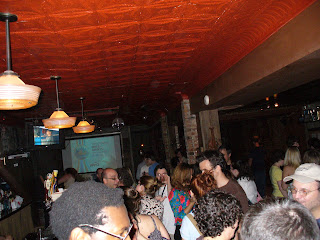 My coworker Katie chats with EL Council Member Sylla on Floyd's comfy couches.
My coworker Katie chats with EL Council Member Sylla on Floyd's comfy couches.
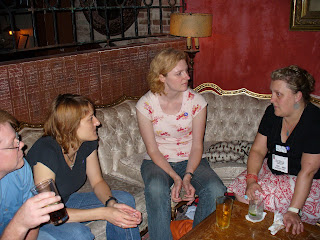
From left to right, Amanda of Harvard Square, Tom of McNally Robinson AND A Public Space, and Megan of Harvard Square (who has the distinction of being the only OTHER person to have both an EL button and an LBC button to her name...)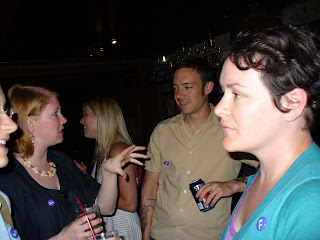
Here the ABA's own Lisa Winn (our EL Liaison) gets into the bocce game, with Kari Patch of Harvard Square looking on.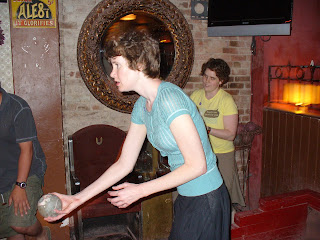
Here my co-conspirator bookseller Amanda Lydon, BTW reporter Karen Schechner, Tattered Cover's Neil, and BEA director Lance Fensterman confab on the couches.
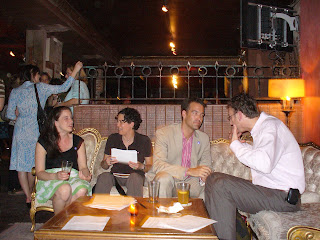 Here we have the ever-youthful John Mutter of Shelf Awareness and Susan Weiss of breathe books in Baltimore, classing up the party.
Here we have the ever-youthful John Mutter of Shelf Awareness and Susan Weiss of breathe books in Baltimore, classing up the party.
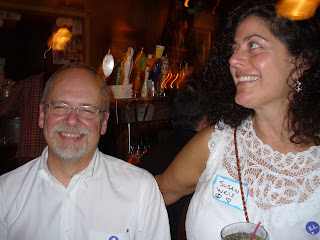
Here we find the inimitable Lance Fensterman in a rare moment of leisure.

And my favorite -- Book Nerd and Mr. BEA, totally geekin' out at the greatness of it all.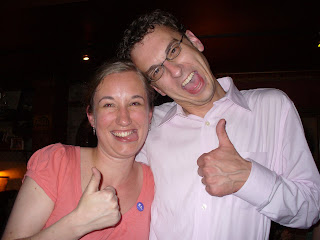
Here we graciously draw the curtain over EL-BEA (though I may have other, more incriminating photos if anyone's interested...)
On to Thursday night. Here's the prettiest crowd shot from Kettle of Fish, where members of the Litblog Co-Op and a couple hundred of their closest friends gathered to hobnob with their fellow book folks.
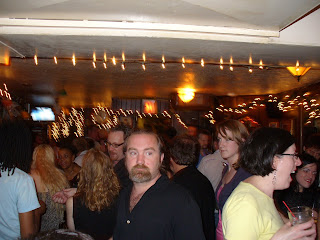
Here's the smoking lounge outside -- there's Megan again, Richard Nash from Soft Skull Press, Jill from Powell's (thanks Dave!), and a flash of red hair that is Carolyn of Pinky's Paperhaus.
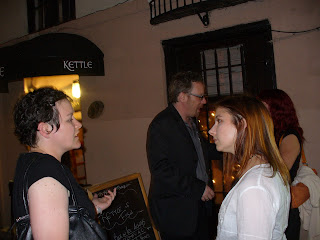
I'm out of time and I have to run to work, so I'll have to post the rest tomorrow and Friday. Have fun -- let me know if there are other places I should look for great BEA pictures...
Read the rest of this post
I've got books to review, too, but I'm behind on my links, so let's try to keep up!
- In big book world/blog world news, the National Book Critics Circle led by John Freeman has launched a campaign to save the newspaper book section -- specifically, to keep the Atlanta Journal-Constitution from firing its book review editor and eliminating the section. The campaign has sparked interest everywhere, including this article in the New York Times positing that reviews may be moving from mainstream print media to blogs (and everyone's got an opinion on that one). The Times article mentions a bunch of my fellow Litblog Co-Op members -- major congrats, guys!
I think many folks ultimately agree that newspaper book review sections and amateur literary blogs both are (or can be) vital parts of the nation's literary culture and conversation -- it's not an either/or thing. There's something to be said both for the professional editorial "filtered" atmosphere of a book review section (and its power to reach masses of readers who might not have been looking for books but find themselves interested), and for the "free-wheeling" passionate amateurism (by which I only mean unpaid, not poor quality) nature of litblogs, which attract a niche audience based on a writer's voice and have some freedoms mainstream media doesn't.
As I've mentioned before, I think book review sections are super important to keep books in the forefront of our cultural conversation, and I'm signing the NBCC's petition to keep them around. Take a look around at the conversation swirling around this issue and make up your own mind; I'd be curious to hear what you think.
- Speaking of the conversation and the internet, I've finally broken down and joined Shelfari, thanks to a personal invite from BEA director Lance Fensterman. And y'all are right -- it's super addictive, and super easy. Had I but world enough and time (sorry, Marvell), I'd be spending many an hour cataloguing my book holdings for interest and discussion. As is, I'm going to just try to make sure the books I review here on the blog are on my virtual "shelf". I'm booknerdnyc, of course -- feel free to befriend me in the big Borgesian library in cyberspace. Good book-nerdy fun!
- And speaking of conversations between nerds, I was thrilled to be a part of a panel at New York's Museum of Comic and Cartoon Art this past Monday, as part of their ongoing MoCCA Mondays series. The subject was "Interstitiality and the Comic Book Industry," hosted by the Interstitial Arts Foundation. (It's a fancy word that means "in between", in case you wondered -- kind of like "liminal".) Since I'd just finished reading the IAF's new anthology Interfictions, and the ALP and I have spent way too many hours talking about comics and genre and where to shelve things in the bookstore, I was full of thoughts. The audience was small, but engaged, and it was great to share the conversation with a comics creator, a publisher, and a comics critic and explore the notion of betwixt-and-between that defines the interstitial. I'd highly recommend checking out any further projects coming from MoCCA and the IAF -- good thinkers about the flux-y state of things in the postmodern book world.
That about wears me out for today. See you here on Friday -- happy reading!



Sounds a bit like Going After Cacciato, but less so.
I wonder if the objectifying tropes of a War Story supercede those of the Travel Romance?
Also, I like the thought of you carefully unravelling the story at that perfect scene.
Is it in a Herzog film that we see a man who's been maintaining a few feet of track and a train engine out of loyalty to a wild eyed Klaus Kinsky, who then orders his new expedition crew to strip the rails for later use? Maybe I'm conflating two movies.
Heh. I went to LBC and in the introductory review of the book Dan already called me out on the predictible Tim O'Brien comparison.
Fine then, let me mention an unknown little title I found in a dusty corner of a used book store that had a similar feel. What was that called, the Swaddled and the Dead? Something like that. Look for it, it may still be in print.
The only O'Brien I've read is The Things They Carried. I like the title story, but never really connected with the book as a whole, for whatever reason.
As for the film, you may be conflating a few, or you're thinking of a Herzog's Fitzcarraldo. Though it's not a train, but rather a boat. Which they bring over a mountain on rails.
Thank you, it was Fitzcarraldo, which I loved more than most Herzog, and the train scene is in there. Before the boat is introduced to the mountain.